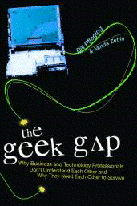Are Techies Arrogant?
Funny thing about that New York Times article. It took the position that technical support people are arrogant, and that arrogance is their default setting. So much so that, when business people find the rare non-arrogant specimen, they hang onto him or her for dear life.
I'm not really qualified to represent the suit point of view on this particular topic because, well, I married my tech support. Which I guess means that getting arrogiant with me could have consequences outside the usual range for most service geeks.
What would it be like to be a garden variety small business owner with garden variety computer problems? I spend a lot of time listening to techies complain about the clueless users ("lusers") who need to have the simplest tasks explained to them over and over, and chuckled over the acronym PEBCAK (problem exists between chair and keyboard)--explained to me by a pal of mine who spent what he thinks of as a purgatorial period providing telephone techinical support.
But perhaps I haven't looked enough at the other side of the support equation: People who aren't technologically adept, but still use computers on a daily basis and sometimes need help and advice, preferably given with patience and in plain English. Maybe if I did, I'd know whether this complaint that many support people are arrogant is based in fact or just perception.
One of the most interesting comments in the piece came near the end, when someone quoted in the article postulated that geeks would be forced to become less arrogant in future years, as they face competition for their jobs. Of course, those who live in geekdom know that they already face pretty tough competition for their jobs, much of it from some very un-arrogant people in places like Bangalore. So I somehow doubt that job competition will change things.
I think it's more an issue of geek status, which seems to go through up and down cycles. At its height, in the late 1990s, I remember reading a New York Times Magazine article about how the young geek entrepreneurs were seeking seats on the boards of powerful foundations--they wanted to make their influence felt! At the opposite end of the pendulum swing were the days when Bill's former geek colleagues found themselves selling commercial real estate or repairing bicycles because those were the only things employers thought they were good for.
Somewhere between those extremes of high and low status is balance, just as somewhere there's balance between the suits who think technical support people can't be bothered to teach, and geeks who think the people needing technical support can't be bothered to learn.
Finding that balance...that's the tricky part. And will be, I think, for years still to come.
I'm not really qualified to represent the suit point of view on this particular topic because, well, I married my tech support. Which I guess means that getting arrogiant with me could have consequences outside the usual range for most service geeks.
What would it be like to be a garden variety small business owner with garden variety computer problems? I spend a lot of time listening to techies complain about the clueless users ("lusers") who need to have the simplest tasks explained to them over and over, and chuckled over the acronym PEBCAK (problem exists between chair and keyboard)--explained to me by a pal of mine who spent what he thinks of as a purgatorial period providing telephone techinical support.
But perhaps I haven't looked enough at the other side of the support equation: People who aren't technologically adept, but still use computers on a daily basis and sometimes need help and advice, preferably given with patience and in plain English. Maybe if I did, I'd know whether this complaint that many support people are arrogant is based in fact or just perception.
One of the most interesting comments in the piece came near the end, when someone quoted in the article postulated that geeks would be forced to become less arrogant in future years, as they face competition for their jobs. Of course, those who live in geekdom know that they already face pretty tough competition for their jobs, much of it from some very un-arrogant people in places like Bangalore. So I somehow doubt that job competition will change things.
I think it's more an issue of geek status, which seems to go through up and down cycles. At its height, in the late 1990s, I remember reading a New York Times Magazine article about how the young geek entrepreneurs were seeking seats on the boards of powerful foundations--they wanted to make their influence felt! At the opposite end of the pendulum swing were the days when Bill's former geek colleagues found themselves selling commercial real estate or repairing bicycles because those were the only things employers thought they were good for.
Somewhere between those extremes of high and low status is balance, just as somewhere there's balance between the suits who think technical support people can't be bothered to teach, and geeks who think the people needing technical support can't be bothered to learn.
Finding that balance...that's the tricky part. And will be, I think, for years still to come.



